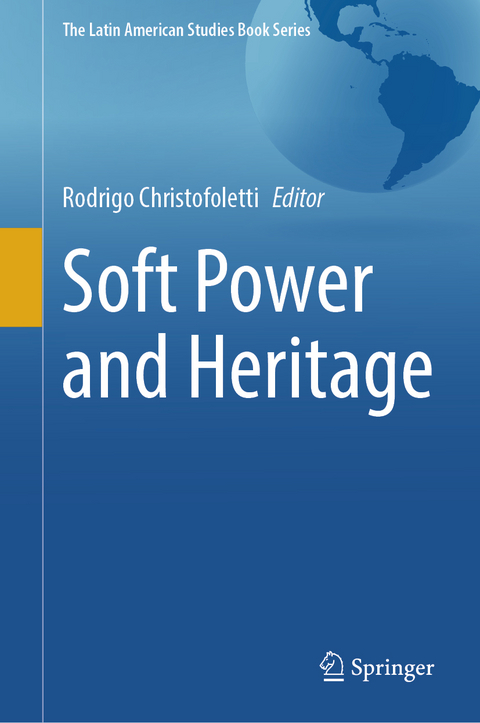
Soft Power and Heritage
Springer International Publishing (Verlag)
978-3-031-41206-6 (ISBN)
This book encourages a critical dialogue between interdisciplinary fields that border heritage boundaries and seeks to contribute a wide range of scholarly perspectives and case studies (both national and international). The widespread use of the concept of soft power is sometimes grossly misused as a synonym for anything other than military force. While the concept is one of the most popular and influential in progressive foreign policy circles and is noted for being the ability of a country to convince others that its cause is the best, without having to resort to economic or military threats, the your ability to accurately describe the world we live in needs repair lenses. The power of example, the power of attraction through culture or, in other words, the ability of a country to attract others because of its culture and political values in its foreign policy, that is, soft power, is something that emerges in partly because of government and partly in spite of governments. To have soft power, you need to be connected, and the interaction, management and dissemination of assets can be seen as exercises in soft power action. This book seeks to detail in examples how the concept of "soft power" encompasses and problematizes the multiplicity of themes on the contemporary international agenda, focusing on one of its least discussed elements: the universe of international cultural heritage and the relationship between actors and society, preservationist actions in the globalized world. While cultural heritage embodies different values and can serve different economic, social and political objectives in development contexts, the past becomes a cultural currency when it becomes essential to the human experience.
lt;p>Rodrigo Christofoletti holds a degree in History from Universidade Estadual Paulista - UNESP/Assis (1998), a Master's in History from the same university (2002) and a PhD in History, Politics and Cultural Assets from Fundação Getúlio Vargas (2010). He is currently a professor of Cultural Heritage in the History course at the Federal University of Juiz de Fora (UFJF) and teaches in the Graduate Program at the same university. He coordinates the specialization course in History and Culture in Contemporary Brazil (EAD) at CEAD-UFJF and the Collection Section of CECOM - Center for the Conservation of Memory at UFJF. He is a researcher at LAPA - Heritage Laboratory at UFJF and a collaborator at CITCEM - Center for Transdisciplinary Research, Culture, Space and Memory at the Faculty of Letters of the University of Porto (FLUP).
PART 1- SOFT POWER ACTORS: A supreme court for history? UNESCO as battleground for the legitimacy of historiographical narratives.- Spatial disposition of UNESCO's Cultural Heritage and Soft Power: a survey on the possibility of reification of power discrepancies.- Polycam and the power of heritage registration in the palm of your hand: UNESCO's strategy to safeguard memory in ukraine war.- Peace and Hiroshima's Cultural Heritage: exploring the soft-power of paradiplomacy and international youth engagement for a Culture of Peace.- Cultural Mercosur: a regional vision of cultural heritage as Soft Power.- Heritage diplomacy matters? Brazil's foreign policy and South-South Cooperation in cultural heritage.- Intangible Cultural Heritage and the Brazilian Soft Power: exploring the relationship in international politics.- Brazil's Active and Loyal Politics with the African Continent on the Relationship of Soft Power and Heritage (2002-2008).- The possible paths of power: soft power onthe agenda.- PART 2 - SOFT POWER SPACES: Universalism and diversity: the 50th anniversary of the UNESCO World Heritage Convention.- Decolonizing the World Cultural and Natural Heritage. A question of rupturing the perpetuation of hierarchy of memories and knowledge.- The African soft power: the case of Republic Democratic of Congo.- Cultural experiences from Brazil and Africa: the management of intangible cultural heritage within the scope of soft power.- The Protection of the Underwater Cultural Heritage: an important soft power strategy.- Destruction of antiquities, museums and archaeological sites in Syria during the war: methods of protecting them.- Circulation of Sacred Art in the Internet Underworld.- "We're back": Background and outcomes of repatriation, return and restitution of cultural property.- African museums in the face of the debate around the decolonization of museums: cases of Senegal and Guinea-Bissau.- PART 3 - SOFT POWER BORDERS: Cultural heritage and international cooperation: Lusophone diplomatic strategies.- Between the power of the museum and the power of the community: case studies in Portugal and Brazil.- Museum Documentation as a weapon of Soft Power.- Energy transition: Chinese capital in the renewable energy production in Brazil.- Timorese Tais: Protection and preservation of a traditional weaving technique.- Soft Power and the diffusion of Brazilian music.- Collective memory of public space: a path for preservation through affective appropriation.- The decolonial study of cultural heritage in the school environment: Historical consciousness in development.- Soft Power, Heritage and Memory during Colonialism and Post Independence in Mozambique.
| Erscheinungsdatum | 16.11.2023 |
|---|---|
| Reihe/Serie | The Latin American Studies Book Series |
| Zusatzinfo | XV, 470 p. 53 illus., 40 illus. in color. |
| Verlagsort | Cham |
| Sprache | englisch |
| Maße | 155 x 235 mm |
| Gewicht | 887 g |
| Themenwelt | Geisteswissenschaften ► Geschichte ► Hilfswissenschaften |
| Geschichte ► Teilgebiete der Geschichte ► Kulturgeschichte | |
| Sozialwissenschaften | |
| Schlagworte | Illicit trafficking of cultural goods • Intangible Cultural Heritage • International heritage • Natural heritage • World Heritage |
| ISBN-10 | 3-031-41206-0 / 3031412060 |
| ISBN-13 | 978-3-031-41206-6 / 9783031412066 |
| Zustand | Neuware |
| Haben Sie eine Frage zum Produkt? |
aus dem Bereich


